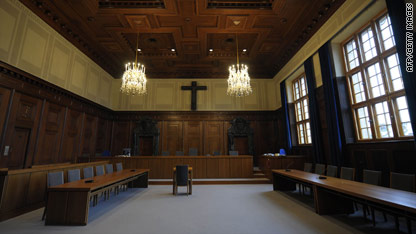New York It's the greatest trial that never was -- of Osama bin Laden.
 Top U.S. national security officials said the American commandos who killed bin Laden on Sunday were prepared to capture him alive if he had surrendered -- but officials said they didn't expect the al Qaeda leader to give up without a fight.
Top U.S. national security officials said the American commandos who killed bin Laden on Sunday were prepared to capture him alive if he had surrendered -- but officials said they didn't expect the al Qaeda leader to give up without a fight.Of course, bin Laden has now gone to an unmourned death, but if he had been captured rather than killed, it would have made all the previous legal proceedings arising out of the war on terror look simple by comparison.
It does seem certain that bin Laden would have been put on trial, tempting though it might have been to execute him on the spot. But how and where that trial would have taken place is far from certain.
1. Trial: Civilian vs. military?
Given the outcry that greeted U.S. Attorney General Eric Holder's plan to try suspected 9/11 mastermind Khalid Sheikh Mohammed in a civilian court -- which led Congress to abort that plan -- it seems clear that bin Laden wouldn't have received a civilian trial either.



RELATED TOPICS
Just for starters, there would have been a huge outcry if bin Laden had been allowed to set foot on American soil. So it seems clear that bin Laden would have been tried by military tribunal.
The outcome of that trial would never have been in doubt, but there are many questions that would need to be answered about it:
2. Where would he have been tried?
It appears that Mohammed will be tried by tribunal in the American detention facility in Guantanamo Bay, Cuba. That place has a poisonous public reputation, not least because of attacks on its legitimacy by candidate Barack Obama throughout 2008.
Obama and others said that the Bush administration's decision to establish Guantanamo as a place beyond the reach of the legal system -- and one where allegations of torture persisted -- made the facility in effect a recruiting tool for terrorists.
Obama's vow to close it has become, perhaps, his best-known unfulfilled campaign promise.
Bin Laden-in-Gitmo is a public symbol the United States would have wanted to avoid. It might have looked like the U.S. was stretching its own rules, and damaging its own reputation, to nail a hated enemy.
3. Access to U.S. intelligence
But the location of the trial is only the first of the questions about it.
Defendants, including military detainees, are entitled to see the evidence against them, and seek out evidence on their own.
Would bin Laden really have been allowed to rummage through U.S. government files in order to defend himself?
Would the CIA and other national security agencies have allowed bin Laden to see those documents? How could bin Laden have had a fair trial without seeing them? Years of legal fights might have ensued.
4. Who would have defended him?
Given the taste of many attorneys for attention, and a place in history, there probably would be no shortage of applicants.
But what if bin Laden decided to defend himself, as the so-called 20th hijacker, Zacarias Moussaoui did?
Would the American government, even the military, have given bin Laden that kind of platform? If not, how could bin Laden have received a fair trial if he were stifled in his own defense? Difficult, but not impossible.
5. What would have happened to his body?
Indeed, a trial of bin Laden probably would have proceeded -- slowly, expensively but inexorably toward a verdict of guilty and a sentence of death.
And that raises a final macabre question. The U.S. government made a point of announcing that bin Laden's body was disposed of at sea. There will be no grave to be used by his supporters as a shrine.
But -- in our "what if" scenario -- after bin Laden met his American hangman (or, more likely, lethal injection), could the United States really have dumped his body at sea?
The only thing for sure is that we'll never know.
The opinions expressed in this commentary are solely those of Jeffrey Toobin.
No comments:
Post a Comment